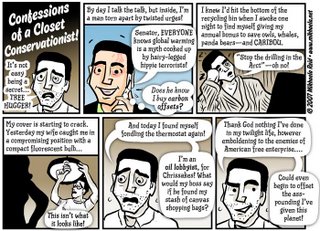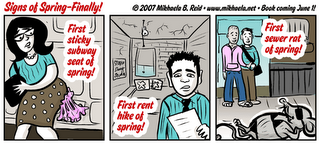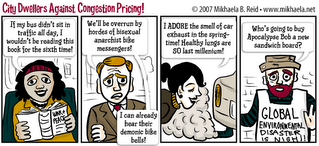Cartoon: America's Soft Toilet Paper Addiction

Click to enlarge
There is no need to wipe your butt with old-growth forests.
Labels: cwa, environment, green

There is no need to wipe your butt with old-growth forests.
Labels: cwa, environment, green

Staving off the Envirapocalypse, One Nanosecond at a Time!
For more on why I drew this cartoon, see this rant and this rant. And yes, of course I recycle and bring reusable bags.
Labels: cwa, environment, green

I've been reading a lot of books about food lately—food politics, the food movement (and cookbooks, too). My front-runner favorite so far has been Raj Patel's inspiring/scathing Stuffed and Starved: The Hidden Battle for the World Food System. His book is much more international than the others, gets into worker, farmer and community food struggles (and successes) around the world and doesn't have a myopic focus on what individual Americans can or should do about their own personal habits. It's about global justice, not personal food purity.
For example, in the otherwise wonderful film "Food, Inc.", after exposing the horrors of factory farms and CAFOs, Big Ag, processed foods, pesticides, GMOs, horrifying working conditions, etc., the film ends with a bizarre feel-good "don't worry, you can vote for good food three times a day" message (get it? you can buy sustainable/local/ethical food three times a day!). But that just ain't enough, any more than replacing a few lightbulbs or buying adorable green products is enough.
One of my favorite passages in Stuffed and Starved comes in the conclusion, when Patel takes a moment to skewer the fantasy of good consumerism:
The honey trap of ethical consumerism is to think that the only means of communication we have with producers is through the market, and that the only way we can take collective action is to persuade everyone else to shop like us. It alters our relationship to the possibility of social change. It makes us think we are consumers in the great halls of democracy, which we can pluck off the shelves in the shops. But we are not consumers of democracy. We are its proprietors. And democracy happens not merely when we shop, but throughout our lives.But wait! there's more!
The connection between those who eat and those who grow food cannot be measured in terms of brand loyalty points or dollars spent. To short-cut the food system, and to know the people who grow our food, is more than to broker a relationship between buyer and seller. It is to build a human contact that goes beyond a simple transaction and that recognizes certain kinds of commonality, certain kinds of subjugation, and struggles, fights, for an end to the systemic inequalities in power which shape the way rich and poor live today. The food system, as we've seen, creates poverty at the same time as it produces an abundance of food. It fosters hunger and disease through its mechanisms of production and distribution. And it was forged in large measure because of the fear that urban workers and rural peasants would jump out of their social positions. That they would demand equality. The system was designed to siphon wealth from rural areas, with just enough redistributed to keep people quiet. But people acting, en masse, for equality, has been the only force that has changed the world. This is what makes food sovereignty far richer, and more enriching, than an ethical form of hedonism for those able to afford it.
Hells yeah. Patel has more on food sovereignty on his website along with suggestions for action (which DOES include shopping locally and sustainably, but doesn't stop there).
Also on the topic of the limits of ethical consumerism and individual action, I came across this great piece by Derrick Jensen, "Forget Shorter Showers: Why Personal Change Does Not Equal Political Change", a point he also makes in a graphic novel co-authored by my pal Stephanie McMillan, As the World Burns: 50 Simple Things You Can Do to Stay in Denial.
More cartoons by me on related topics:
Labels: cwa, environment, food, justice

If I see one more article about a gazillion pieces of fancy overpriced "organic" or "recycled" designer crap we can cram into our lives to pretend we're doing something significant to save the planet, I'm going to shoot some (organic!?) steam out my ears.
With every Earth Day there comes a flood of special newspaper and magazine "Green Issues," all generally pushing the same deluded feel-good idea that if only we replaced non-green products with slightly more green products, we'd really Make a Big Difference and Save the Planet. We don't really need to change our consumer culture or hold corporate polluters accountable or enact sweeping and drastic environmental legislation--we just need to change our lightbulbs and wear organic cotton T-shirts.
Case in point: Domino magazine's latest "Green" issue (cover headline: "150 Easy Ways to Go Green") and "Green" list, all about "easy" and "painless" ways to save the planet... by nothing more stressful than shopping. Which is kind of like saving money by... buying what you don't need because it's on sale.
Domino's special Green issue is just an extension of their "my green life" column, which features a different model or celebrity or "activist" each month talking about all the fancy products and organic jeans they CONSUME and BUY while flying around the country on... jet fuel. Sure, life is full of contradictions. I fly myself. I don't live a perfect green life. I can't manage to embody all of my politics in everything I do as an individual in my daily life. But I don't hold my lifestyle up as a magic model that will easily and painlessly save the world.
Anyway, here's the thing: buying more fancy stuff you don't need (no matter how organic or recycled it is) is fundamentally an anti-green act. If you replace your perfectly good couch with some fancy organic or more sustainably produced designer creation, that does not mean you are saving the planet. It means you are buying a nice couch that is slightly less destructive than another couch. You're still consuming, and you're still creating waste. You are not a hero, and you are not an activist, you're just a less destructive shopper.
And shopping is not a substitute for action. Buying a red sweatshirt or red iPod that donates 1% of its profits to a poorly-run AIDS charity that spends all its money advertising red sweatshirts or red iPods is not real action for change. A lot of this feel-good, do-nothing shopping as "activism" (ActivismTM) crap is just an excuse to give yourself an excuse to BUY MORE CRAP YOU DON'T need.
Don't get me wrong--I do think it's good that more manufacturers and craftspeople and companies are being conscious of what goes into their products, and trying to minimize their impact on our already overtaxed planet. I think it's messed up that it took Apple this long to design a greener Mac. I am all for architects designing more environmentally-friendly and energy-efficient buildings (though before you go through the trouble of constructing some perfect energy-saving home, it might be more green to buy one of the many vacant homes that already exist).
And yes, if you DO have to buy something new, it's much better to buy something sustainably produced, something made under fair labor practices, etc. Or to buy something used and discarded by another American shopaholic. I get a good percentage of my work attire from the Goodwill, and I'm not talking holey sweaters and ratty jeans--I'm talking tailored skirt suits and cashmere cardigans.
But back to buying new--if "environmental"--stuff. A lot of these fancy new products aren't green, they're "Green(TM)." They're green as a marketing tool, not as a reality. Like the green Hummer I cartooned about recently. If you buy a "green" Hummer or if you buy more than you would have normally have of something because that product is "greener" and somehow more virtuous--well, the marketing team that pulled one over on you is getting a big bonus for sure.
Many of the products featured in Green Issues are cosmetically green at best--their "green" or "organic" labels are just another sales pitch or a designer fashion trend, and we all know how fickle the fashion world is. One minute fur is out. The next all those models who appeared in anti-fur ads are strolling down the runway covered in peeled fox heads.
So no, watching an Al Gore documentary or buying recycled organic toilet paper is not going to save the world. We need drastic change and we need it yesterday and it is NOT going to be EASY.
Some further reading:
Labels: climate change, cwa, environment
Labels: cwa, environment
 This is one of those kitchen sink cartoons where I took a bunch of stuff that always pisses me off and wrapped it into a critique of a new thing that pisses me off. That new thing is the mass delusion behind the stimulus package: that giving a few hundred dollars in rebates to every taxpayer at one time—and encouraging them to go out and shop with it—will somehow magically Fix the Economy.
This is one of those kitchen sink cartoons where I took a bunch of stuff that always pisses me off and wrapped it into a critique of a new thing that pisses me off. That new thing is the mass delusion behind the stimulus package: that giving a few hundred dollars in rebates to every taxpayer at one time—and encouraging them to go out and shop with it—will somehow magically Fix the Economy.
A few hundred dollars doesn't mean squat when you're about to lose your house because you've been conned into a subprime mortgage. A few hundred dollars doesn't mean squat when you don't have a job. Maybe you can buy food and heat for a month or two, but what about the next month? Also, the last thing most Americans need to do with their money is spend it--most need to pay off debt with it.
As for those other things that piss me off, here are some notes about the four other stupid quick fix stimulus packages:
By the way, I thought about somehow trying to explain or indicate why this girl was a high school dropout, but then I thought it was beside the point. Maybe she went to a crappy school and fell through the cracks. Maybe she got pregnant and didn't get the support she needed to stay in school. Maybe she had such horrible underfunded overcrowded schools since she was young that she never developed a love of learning. Who knows?
The Bush administration's much publicized food ration airdrop in northern Afghanistan - hailed by the Pentagon as a way to feed starving residents while winning their loyalty - achieved neither goal in many targeted areas, military experts, aid workers, and a report by retired US special forces officers now conclude....The bright yellow plastic-wrapped meals ruptured upon impact because they were dropped from too high an altitude and spoiled, endangering the Afghans who ate them, the report by the retired officers said.
Moreover, the meals often were collected by local warlords and sold for a profit at Afghan markets and seldom reached hungry families, according to aid workers. In other cases, Afghans were lured by the bright packages into minefields or confused them with cluster bombs of the same color.
Labels: cartoons, cwa, economy, education, environment, health, iraq, war

Seriously, GM actually unveiled a new "green" HUMMER at the Detroit auto show. But a little ethanol usage does not an environmentally friendly monster SUV make. We've got to rethink transportation on a much deeper level than that.
Labels: auto industry, cartoons, cwa, detroit, environment

I was listening to a debate on the Brian Lehrer show on WNYC over compact fluorescents and I have to say I have them in every room and I like them (and my lower electric bill) just fine. Anyway, the point of this cartoon isn't that individual acts of conservation don't matter, only that voluntary individual conservation isn't enough to stave off global environmental disaster without serious regulation of business and industry. (Stephanie is all over this with her upcoming graphic novel As the World Burns, and Ruben Bolling had a great cartoon about it last week, "Carbon Offsets 'R' Us")

I knew it was finally spring when I squeezed onto a hot, crowded, un-air-conditioned subway car full of scantily clad New Yorkers and unidentifiable odors and promptly stepped into a puddle of gum so warm it had melted. It took me about six blocks of scraping my shoe to extricate myself. -----
Attention: NYC, I'll be doing a free cartoon slideshow and book launch bash for my first book, Attack of the 50-Foot Mikhaela! on Tuesday June 12 at Bluestockings and you are cordially invited.
ATTACK BOOK TOUR | May 19: Philly at Temple U. ; June 9: Detroit at Green Brain Comics; June 12: NYC at Bluestockings. Soon to come: Boston, DC and more!
Labels: appearances, cartoons, environment, events, nyc
 A new federal study shows that abstinence education has no effect whatsoever on delaying sexual activity. Shocking!
A new federal study shows that abstinence education has no effect whatsoever on delaying sexual activity. Shocking!
Also, there really is a (comedy) movie called Killer Condom: The Rubber That Rubs You Out, though I haven't seen it myself.
 OK, so maybe New York charging cars $8 to cut down on pollution and traffic and improve public transport won't stave off environmental apocalypse, but it's a start. (Personally, I'd rather see NO personal cars in the city—maybe then I'd be brave enough to take my bike into Manhattan!).
OK, so maybe New York charging cars $8 to cut down on pollution and traffic and improve public transport won't stave off environmental apocalypse, but it's a start. (Personally, I'd rather see NO personal cars in the city—maybe then I'd be brave enough to take my bike into Manhattan!).
 A sequel to 2005's "Sick Confessions of a Serial Bomber!" I did it before I went away on vacation, and it already feels pretty dated. Ah well.
A sequel to 2005's "Sick Confessions of a Serial Bomber!" I did it before I went away on vacation, and it already feels pretty dated. Ah well.
P.S. Join my weekly mailing list by sending a blank message to newtoons-subscribe@mikhaela.net!
P.P.S. My first book collection, Attack of the 50-Foot Mikhaela!, goes on sale in just a few short weeks!
Labels: abstinence, antiwar, bush, cartoons, environment, nyc, politics, sexuality, transportation, war
This is not a Daily Show parody, but a real pro-pollution ad from the Competitive Enterpise Institute. I heard about this bizarre "pollution is good for you" ad campaign via NPR, and had to share.
Labels: environment, humor, lies, pollution, propaganda, video